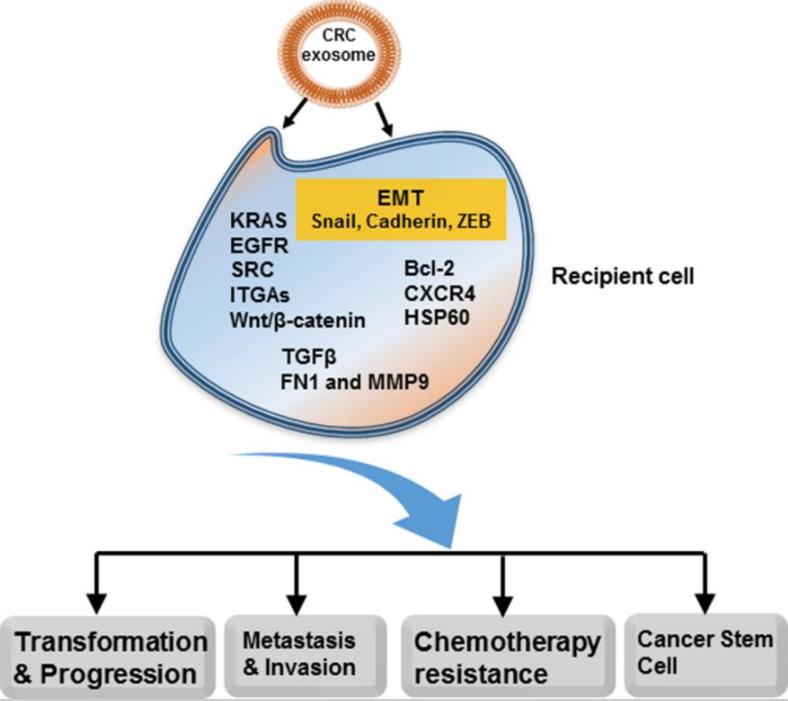Colorectal Cancer Exosome Research Solution
Online InquiryColorectal cancer (CRC) is a common gastrointestinal malignancy and has emerged as the second most deadly cancer in the world. CRC is rapidly increasing worldwide and has become one of the most widely diagnosed cancers in men and women today. Increased risk of this cancer is often associated with unhealthy lifestyle habits, including poor diet, lack of physical activity, and smoking. Developing early screening, diagnosis and treatment methods can effectively reduce the mortality of CRC. Increasing studies have found that exosomes play crucial roles in various cancers, including CRC.
The role of exosomes in colorectal cancer
Exosomes are nano-scale (typically~30-150 nm in diameter), cell-derived extracellular vesicles (EVs) released through exocytosis of multivesicular bodies (MVBs) via the endosomal pathway. These EVs participate in intercellular communication by transporting various bioactive substances, such as RNAs, proteins, and lipids. Exosomes have been reported to play key roles in CRC initiation, enhancing tumorigenicity, regulating the tumor microenvironment (TME), promoting anti-apoptotic signaling pathways, promoting angiogenesis, establishing an immunosuppressive environment, and so on. Notably, exosomes also elicit drug resistance in CRC. With intensive exploration, researchers have found that many differentially expressed RNAs and proteins in exosomes play a key role in CRC development and progression. They are potential candidates for this malignancy detection.
 Fig. 1 Multiple roles of exosomes in CRC. (Zhou, Jianbiao, et al., 2017)
Fig. 1 Multiple roles of exosomes in CRC. (Zhou, Jianbiao, et al., 2017)
Colorectal cancer exosome research solution at Creative Proteomics
Creative Proteomics is a CRO comprised of experienced scientists, rigorous analytical processes, and a state-of-the-art platform. Our global team is able to provide cancer exosome research support to researchers in pharmaceutical, biotechnology, and academic and government institutions. We are committed to exploring the correlation between these exosomes and CRC to help develop novel biomarkers and therapeutic targets for this disease.
Our technology platform
-Sucrose gradient centrifugation
-Polymer-based exosome enrichment method
-Immunomagnetic bead method
-Size exclusion chromatography method
-WB verification
-Electron microscope
-Nanoparticle tracking analysis (NTA)
-Flow cytometry
iTRAQ, SWATH, Label-free, PRM, various quantitative proteomic technologies to assist you in discovering key proteins of signal transduction pathways, discovering disease markers, and discovering drug targets.
Characterization of some of the key biochemical components involved in physiopathological processes at the subcellular level, including non-targeted screening and targeted analysis.
Major benefits of our services
- Cutting-edge technology and advanced platform
- High-throughput facility and strict analysis workflow
- Powerful exosome research and analysis competence
- Customized services from experienced experts
Creative Proteomics is committed to offering high-quality customized service and the best outcome to accelerate the research progress for our global customers. If you are interested in this area, please feel free to contact us.
References
- Zhou, Jianbiao, et al. "Tumor-derived exosomes in colorectal cancer progression and their clinical applications." Oncotarget 8.59 (2017): 100781.
- Xiao, Yongwei, et al. "Exosomes as potential sources of biomarkers in colorectal cancer." Cancer letters 476 (2020): 13-22.
* For Research Use Only. Not for use in diagnostic procedures.



